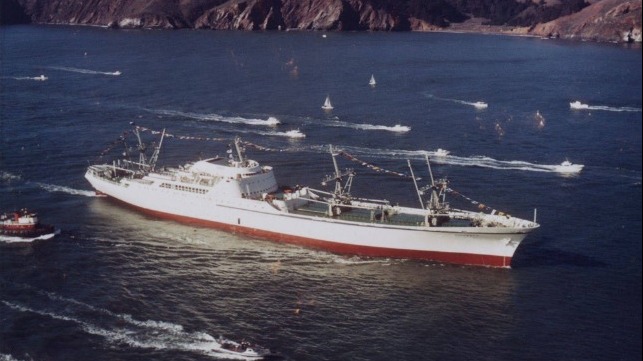DOE and ABS Launch New Studies on Nuclear Energy for Commercial Ships

The U.S. Department of Energy has awarded ABS a contract to research barriers to the adoption of advanced nuclear propulsion on commercial vessels.
The $800,000 research project, which was awarded by the DOE’s Office of Nuclear Energy last year, is now being formally contracted through its U.S. Industry Opportunities for Advanced Nuclear Technology Development funding opportunity.
According to ABS, the scope of the research project will address the challenges of adopting new reactor technology in commercial maritime applications. ABS will develop models of different advanced reactor technologies for maritime applications and develop an industry advisory on the commercial use of modern nuclear power.
While nuclear power was viewed to have great potential for the maritime industry in the 1950s, it failed to develop due to safety concerns globally and the challenges of operating the systems aboard ships. Navies around the world successfully adopted nuclear propulsion, but despite numerous studies and a project supported by U.S. President Dwight Eisenhower, the U.S. only built one demonstration commercial ship the NS Savannah. Russia is believed to be the only country that continued to operate a nuclear-powered merchant ship.
Support for the new project will be provided by the Department of Energy’s National Reactor Innovation Center (NRIC), based at Idaho National Laboratory. NRIC will provide the advanced reactor framework to help propose how a maritime nuclear demonstration could take place.
“The national lab system has powerful capabilities – when we partner with industry, we can jointly apply those to our energy challenges, and NRIC was created to make that happen faster,” said NRIC director Ashley Finan. “There’s a tremendous opportunity to reduce emissions in shipping, as well as growing interest from both the maritime and advanced nuclear sectors, and we’re pleased to be a part of this important work.”
One of the technologies that have drawn a lot of attention are the concepts for molten salt reactors. In a separate, smaller award, the DOE has also contracted ABS to support research into molten salt reactors being carried out by the University of Texas.

that matters most
Get the latest maritime news delivered to your inbox daily.
“Modern nuclear technologies are increasingly suggested as a potential solution to shipping’s decarbonization challenge,” said Patrick Ryan, ABS Senior Vice President, Global Engineering and Technology. “The technology certainly has potential both in terms of its contribution to emissions reduction and for U.S. shipyards and their supply chains to leverage national investment in terrestrial nuclear energy development. Nevertheless, many questions need to be answered and it is critical the industry is able to evaluate these technologies with a laser focus on safety.”
ABS did not announce the duration of the project. They, however, noted that their work with maritime nuclear energy sources dates back to 1959 with the NS Savannah, which was the first merchant ship powered by a nuclear reactor and approved under ABS Rules.
